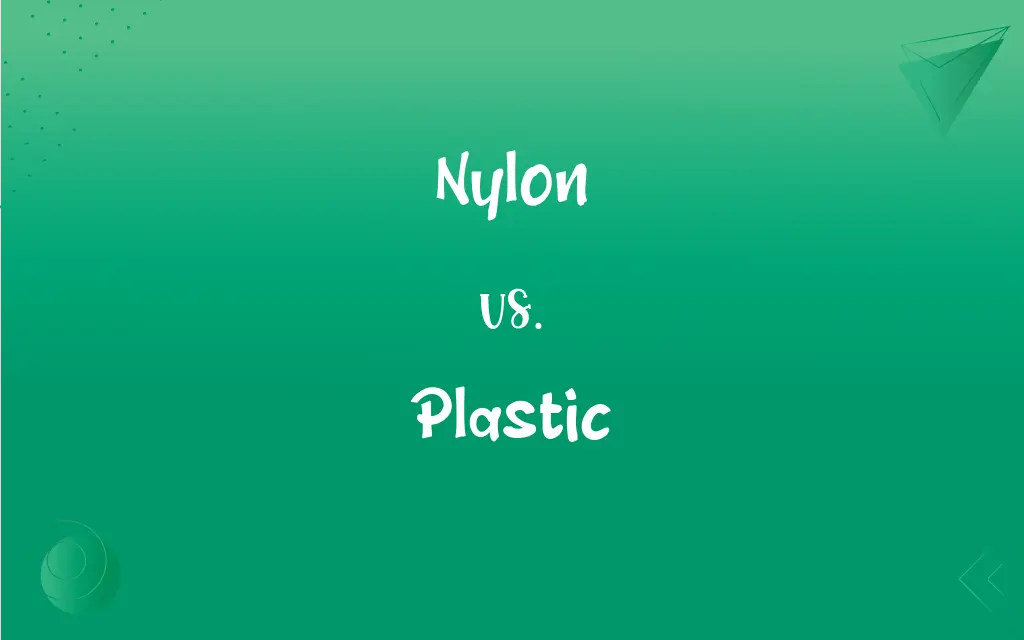Nylon vs. Plastic: What's the Difference?
Edited by Aimie Carlson || By Janet White || Published on December 21, 2023
Nylon is a synthetic polymer, specifically a type of polyamide, while plastic is a broad category of synthetic or semi-synthetic materials.

Key Differences
Nylon, a type of polyamide, is known for its strength, elasticity, and resistance to abrasion, often used in textiles and fibers. Plastic, on the other hand, is a more general term encompassing a wide range of synthetic materials, each with varying properties.
The production of nylon involves the condensation polymerization of specific molecules, giving it distinct characteristics like high melting point and durability. Plastics can be produced through various polymerization processes, resulting in diverse materials like PVC, polystyrene, and polyethylene.
Nylon is famous for its use in clothing, ropes, and industrial components due to its flexibility and toughness. Plastics have a broader application range, including packaging, construction materials, and household items, reflecting their versatility.
Environmental impact differs; nylon production is more energy-intensive and contributes to nylon waste issues. Plastics, while also raising environmental concerns, especially single-use plastics, offer recycling possibilities in many cases.
In terms of consumer products, nylon is often associated with textiles and high-strength fabrics, whereas plastics are ubiquitous in everyday items like containers, toys, and furniture.
ADVERTISEMENT
Comparison Chart
Composition
A type of polyamide.
A broad category of synthetic materials.
Usage
Common in textiles and industrial components.
Wide-ranging, including packaging and household items.
Properties
Strong, elastic, abrasion-resistant.
Varies widely (flexible, rigid, transparent, etc.)
Environmental Impact
Energy-intensive production; waste issues.
Diverse impact; some recyclable types.
Production Process
Condensation polymerization.
Various polymerization methods.
ADVERTISEMENT
Nylon and Plastic Definitions
Nylon
A type of plastic used in various products.
These nylon kitchen utensils are heat resistant.
Plastic
Often used for packaging due to its flexibility.
Most of our groceries come in plastic packaging.
Nylon
A durable synthetic polymer used in textiles.
Her dress is made of smooth, lightweight nylon.
Plastic
Material known for being moldable and durable.
The plastic container can be reused multiple times.
Nylon
A material known for its strength and elasticity.
The nylon ropes are used for their high tensile strength.
Plastic
A synthetic material made from a wide range of organic polymers.
The plastic bottle is lightweight and convenient.
Nylon
A thermoplastic silky material.
The nylon stockings were popular for their durability.
Plastic
A versatile material used in numerous applications.
Children’s toys are often made from colorful plastic.
Nylon
A fabric commonly used in clothing and gear.
His nylon jacket is both water-resistant and breathable.
Plastic
Refers to synthetic or semi-synthetic organic compounds.
The plastic components in electronics are heat resistant.
Nylon
Any of a family of high-strength, resilient synthetic polymers, the molecules of which contain the recurring amide group CONH.
Plastic
Capable of being shaped or formed
Plastic material such as clay.
Nylon
Cloth or yarn made from one of these synthetic materials.
FAQs
What is nylon?
A synthetic polymer, specifically a type of polyamide.
Can plastic be biodegradable?
Some modern plastics are designed to be biodegradable.
Can nylon be used in outdoor gear?
Yes, it's often used in outdoor equipment for its durability.
How is plastic made?
Through polymerization of organic compounds.
What are common uses of plastic?
Packaging, construction, household items, and more.
Can plastics be heat resistant?
Yes, some plastics are designed to withstand high temperatures.
What is plastic?
A broad term for synthetic or semi-synthetic materials.
Are all nylons the same?
No, there are different types of nylon with varying properties.
Is nylon recyclable?
Yes, but the recycling process can be complex.
What distinguishes nylon from other plastics?
Its specific chemical structure and properties like elasticity.
What are the benefits of plastic?
Durability, versatility, and moldability are key benefits.
Are there eco-friendly alternatives to nylon?
Yes, there are more sustainable synthetic fibers available.
What's the future of plastic usage?
There's a push towards more sustainable and recyclable plastics.
Can nylon decompose naturally?
No, it does not biodegrade easily.
Is nylon environmentally friendly?
Its production can be energy-intensive, raising environmental concerns.
Are plastics harmful to the environment?
Some can be, particularly single-use plastics.
Is nylon only used in textiles?
No, it's also used in industrial applications and products.
Can nylon be used in high-temperature environments?
Yes, it has a high melting point.
How is plastic disposed of?
It can be recycled, but often ends up in landfills or incinerators.
Is all plastic recyclable?
Not all, as recycling depends on the type of plastic.
About Author
Written by
Janet WhiteJanet White has been an esteemed writer and blogger for Difference Wiki. Holding a Master's degree in Science and Medical Journalism from the prestigious Boston University, she has consistently demonstrated her expertise and passion for her field. When she's not immersed in her work, Janet relishes her time exercising, delving into a good book, and cherishing moments with friends and family.
Edited by
Aimie CarlsonAimie Carlson, holding a master's degree in English literature, is a fervent English language enthusiast. She lends her writing talents to Difference Wiki, a prominent website that specializes in comparisons, offering readers insightful analyses that both captivate and inform.































































